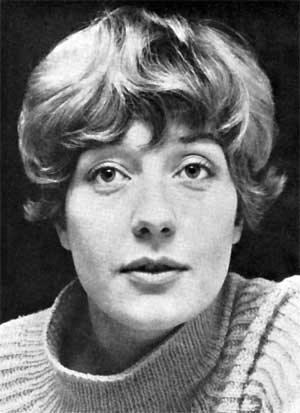Sun Axelsson was born in Gothenburg as the youngest child of a city head gardener, and the lush park area of Slottsskogen (“Castle Forest”) became her safe oasis and realm of dreams. Her mother, who had a German background and was a well-travelled literature aficionado, passed away when Sun was a teenager.
Her foreign heritage and some experiences of bullying led to Sun Axelsson feeling alienated while growing up, something that she herself has said came to characterize her artistry. After graduating in 1955, she studied literary history at the Stockholm University and thus naturally entered the capital’s literary circles. While working as a teacher, she wrote poetry and debuted with the collection Mållös (“Goalless”, 1959).
Axelsson was a true cosmopolitan, loved trains, and filled a summer talk on the radio with colourful travelogues from, among other routes, the Orient Express and the Nord Express to Paris.
During the 60s, she travelled to Argentina, where she wrote for the university newspaper Boletín de la Universidad de Chile and other publications. She described her time in Santiago de Chile in the short breakthrough novel Eldens vagga: En bok om Chile (“The cradle of fire: A Book about Chile”, 1962).
In addition to her fiction writing, she wrote film and literature criticism in, among other publications, Expressen, Aftonbladet, BLM and Ord & Bild. For the film magazine Chaplin, she wrote a fiery post in defence of Mai Zetterling’s film The Girls from both a feminist and an artistic freedom perspective: “It’s still as awkward to be a woman in a man’s society, in a world mostly run by male idiots, as it was a few hundred years ago.”
Not least did Axelsson introduce and translate foreign literature – mainly from Latin America, where she came into contact with, among others, Pablo Neruda, whom she got to know personally, Jorge Luis Borges and Octavio Paz. When she lived periodically in Greece during the 60s and 70s, where she met her future husband, sculptor Michael Piper, and also Leonard Cohen, several critical texts about the military junta and also the book Stenar i munnen (“Stones in the mouth”, 1969) were conceived under the pseudonym Jan Olov Hedlund. Under the same moniker and together with the director Stig Björkman, she directed the documentary Vårt hem på jorden: En grekisk mor hälsar på sin dotter i Sverige (“Our home on earth: A Greek mother greets her daughter in Sweden”, 1971). The film is about Kaliopi, who has hardly been outside her home on the island of Leros, or even had a holiday, and her visit over the Christmas holidays to her daughter Eleni, whom she has not seen for several years and who lives and studies in Stockholm.
In 1978, Axelsson got her big breakthrough with A Dreamed Life, which received the Book of the Year award in Sweden. It was the first in the trilogy Ett eget liv (“A life of one’s own”), which also contained Honungsvargar (“Honey wolves”, 1984) and the August-nominated Nattens årstid (“Season of the night”, 1989), which became a stylistic continuation of the auto-fictional literature that Axelsson began with the aforementioned Eldens vagga, written in first person.
Honingsvargar was adapted for film in 1990 under the direction of Christina Olofson. Included was of course the autobiographical material about a young woman (Mignon, Axelsson’s own birth name) with acting and author dreams, who moves around Stockholm’s literary circles in the 1950s, and with an alluring Chilean poet she would like to follow across the Atlantic.
Axelsson wrote the script for the feature film Gå på vattnet om du kan (“Walk on water if you can”, 1979), directed by Stig Björkman. The main roles were played by Lena Nyman as the literature studying night nurse Orlanda who falls in love with the foreign ministry official Anders (Thomas Pontén), who is temporarily in Stockholm. She accompanies him to Argentina where she is met with unsettling surprises and also gets involved in the fight against military oppression, something that will have fatal consequences.
Axelsson also worked for national Swedish radio and television and made documentaries about, among others, authors Artur Lundkvist and Pablo Neruda. In the late 80s, Axelsson travelled back to Santiago with a team from SVT’s arts program Kulturen in order to create a report about her own history.
Axelsson also wrote children’s books, such as Sagan om en saga (“The tale of a tale”, 1987) with illustrations by Sven Nordqvist and Malvas hemlighet (“Malva’s secret”, 1991). Her last novel Evighetens stränder (“Shores of eternity”) was published in 2001.
Through the years, Axelsson received a number of awards in recognition of her authorship, including the SvD and GP literature prize, presented by the national daily newspapers Svenska Dagbladet and Göteborgsposten respectively. Her life partner Stig Björkman described her as an enormously generous person, something that made its mark in everything she set about: “She saw to it that many talents got their first start.”
Louise Lagerström (2021)
(Translated by Jan Lumholdt)
Basic info
Main professions: Author, Journalist/Film Critic, Screenwriter
Born: 1935
Died: 2011
Active: 1959-2005
Filmography
Regi:
Vårt hem på jorden (1971)
Manus:
Gå på vattnet om du kan (1979)
Speaker:
Vårt hem på jorden (1971)
Översättare:
Alla våra morgondagar (1994)
